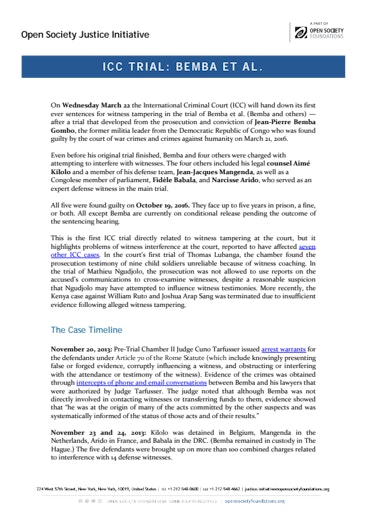ICC Trial: Bemba et al.
On Wednesday March 22 the International Criminal Court (ICC) will hand down its first ever sentences for witness tampering in the case Bemba et al. (Bemba and others)—after a trial that developed from the prosecution and conviction of Jean-Pierre Bemba Gombo, the former militia leader from the Democratic Republic of Congo who was found guilty by the court of war crimes and crimes against humanity on March 21, 2016.
Even before his original trial finished, Bemba and four others were charged with attempting to interfere with witnesses. The four others included his legal counsel Aimé Kilolo and a member of his defense team, Jean-Jacques Mangenda, as well as a Congolese member of parliament, Fidèle Babala, and Narcisse Arido, an expert defense witness in the main trial.
All five were found guilty on October 19, 2016. They face up to five years in prison, a fine, or both. All except Bemba are currently on conditional release pending the outcome of the sentencing hearing.
This was the first ICC trial directly related to witness tampering at the court, but it highlights problems of witness interference at the court, reported to have affected seven other ICC cases. In the court’s first trial of Thomas Lubanga, the chamber found the prosecution testimony of nine child soldiers unreliable because of witness coaching. In the trial of Mathieu Ngudjolo, the prosecution was not allowed to use reports on the accused’s communications to cross-examine witnesses, despite a reasonable suspicion that Ngudjolo may have attempted to influence witness testimonies. More recently, the Kenya case against William Ruto and Joshua Arap Sang was terminated due to insufficient evidence following alleged witness tampering.
The Case Timeline
November 20, 2013: Pre-Trial Chamber II Judge Cuno Tarfusser issued arrest warrants for the defendants under Article 70 of the Rome Statute (which covers knowingly presenting false or forged evidence, corruptly influencing a witness, and obstructing or interfering with the attendance or testimony of the witness). Evidence of the crimes was obtained through intercepts of phone and email conversations between Bemba and his lawyers that were authorized by Judge Tarfusser. The judge noted that although Bemba was not directly involved in contacting witnesses or transferring funds to them, evidence showed that “he was at the origin of many of the acts committed by the other suspects and was systematically informed of the status of those acts and of their results.”
November 23 and 24, 2013: Kilolo was detained in Belgium, Mangenda in the Netherlands, Arido in France, and Babala in the DRC. (Bemba remained in custody in The Hague.) The five defendants were brought up on more than 100 combined charges related to interference with 14 defense witnesses.
November 11, 2014: Pre-Trial Chamber II confirmed the charges. The defendants were charged with corruptly influencing 14 (out of a total of 34) defense witnesses in the main trial, presenting false evidence, and giving false testimony. For Arido, the charges only related to four of the 14 witnesses.
Trial: September 29, 2015 to June 1, 2016. Most of the testimony took place in closed session because of safety concerns. One of the few pieces of testimony in open court came from a prosecution witness, who works with the Investigative Strategies and Analysis Unit of the Office of the Prosecutor. He testified that, according to records both supplied by mobile phone providers and generated by the ICC detention center, there were a total of 897 contacts between Kilolo and witnesses in the main trial, including eight SMS contacts during a time when such contacts were prohibited. Kilolo is also alleged to have transferred funds to the witnesses during this time. (Kilolo contended that the contacts were related to the vetting of witnesses, and the transfers to legitimate expense reimbursements.) The prosecution also presented email intercepts, Western Union money transfer statements, and evidence from witnesses who had agreed to provide false testimony in the main trial.
Verdict: October 19, 2016: Bemba, Kilolo, and Mangenda were found guilty of corruptly influencing 14 witnesses, Arido was found guilty of corruptly influencing four witnesses, and Babala, two. Additionally, Bemba was found guilty of soliciting false testimony, Kilolo of producing false testimony, and Mangenda of aiding the false testimony of two witnesses and abetting the false testimony of seven witnesses. Babala and Arido were both acquitted of charges of aiding the false testimony of witnesses and of the presentation of false evidence.
In convicting the five defendants, the judges relied extensively on the intercepted telephone communications between Bemba, his defense, and witness as well as Western Union wire transfer records. So far three of those convicted—Bemba, Mangenda, and Babala—have filed appeals.
Topics
- Climate Justice
- Digital Rights and Fair Elections
- Discrimination and Racial Justice
- International Crimes
